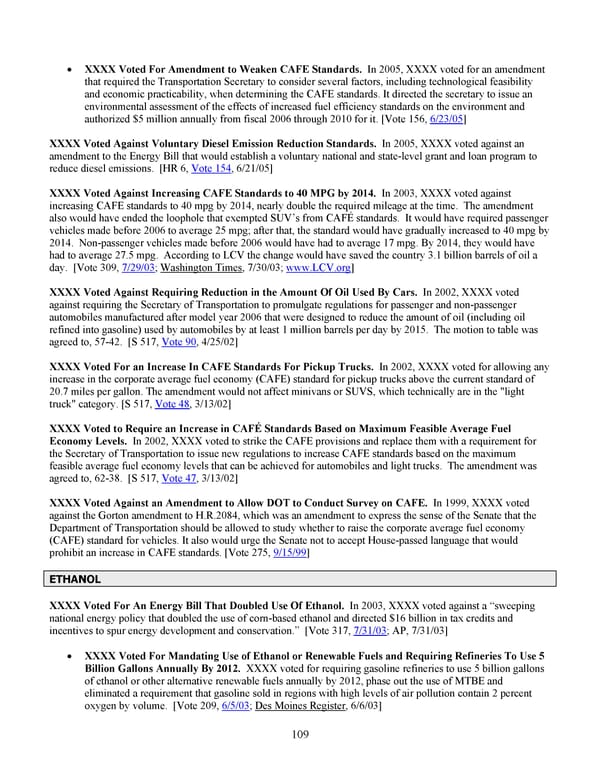XXXX Voted For Amendment to Weaken CAFE Standards. In 2005, XXXX voted for an amendment that required the Transportation Secretary to consider several factors, including technological feasibility and economic practicability, when determining the CAFE standards. It directed the secretary to issue an environmental assessment of the effects of increased fuel efficiency standards on the environment and authorized $5 million annually from fiscal 2006 through 2010 for it. [Vote 156, 6/23/05] XXXX Voted Against Voluntary Diesel Emission Reduction Standards. In 2005, XXXX voted against an amendment to the Energy Bill that would establish a voluntary national and state-level grant and loan program to reduce diesel emissions. [HR 6, Vote 154, 6/21/05] XXXX Voted Against Increasing CAFE Standards to 40 MPG by 2014. In 2003, XXXX voted against increasing CAFE standards to 40 mpg by 2014, nearly double the required mileage at the time. The amendment also would have ended the loophole that exempted SUV’s from CAFÉ standards. It would have required passenger vehicles made before 2006 to average 25 mpg; after that, the standard would have gradually increased to 40 mpg by 2014. Non-passenger vehicles made before 2006 would have had to average 17 mpg. By 2014, they would have had to average 27.5 mpg. According to LCV the change would have saved the country 3.1 billion barrels of oil a day. [Vote 309, 7/29/03; Washington Times, 7/30/03; www.LCV.org] XXXX Voted Against Requiring Reduction in the Amount Of Oil Used By Cars. In 2002, XXXX voted against requiring the Secretary of Transportation to promulgate regulations for passenger and non-passenger automobiles manufactured after model year 2006 that were designed to reduce the amount of oil (including oil refined into gasoline) used by automobiles by at least 1 million barrels per day by 2015. The motion to table was agreed to, 57-42. [S 517, Vote 90, 4/25/02] XXXX Voted For an Increase In CAFE Standards For Pickup Trucks. In 2002, XXXX voted for allowing any increase in the corporate average fuel economy (CAFE) standard for pickup trucks above the current standard of 20.7 miles per gallon. The amendment would not affect minivans or SUVS, which technically are in the "light truck" category. [S 517, Vote 48, 3/13/02] XXXX Voted to Require an Increase in CAFÉ Standards Based on Maximum Feasible Average Fuel Economy Levels. In 2002, XXXX voted to strike the CAFE provisions and replace them with a requirement for the Secretary of Transportation to issue new regulations to increase CAFE standards based on the maximum feasible average fuel economy levels that can be achieved for automobiles and light trucks. The amendment was agreed to, 62-38. [S 517, Vote 47, 3/13/02] XXXX Voted Against an Amendment to Allow DOT to Conduct Survey on CAFE. In 1999, XXXX voted against the Gorton amendment to H.R.2084, which was an amendment to express the sense of the Senate that the Department of Transportation should be allowed to study whether to raise the corporate average fuel economy (CAFE) standard for vehicles. It also would urge the Senate not to accept House-passed language that would prohibit an increase in CAFE standards. [Vote 275, 9/15/99] ETHANOL XXXX Voted For An Energy Bill That Doubled Use Of Ethanol. In 2003, XXXX voted against a “sweeping national energy policy that doubled the use of corn-based ethanol and directed $16 billion in tax credits and incentives to spur energy development and conservation.” [Vote 317, 7/31/03; AP, 7/31/03] XXXX Voted For Mandating Use of Ethanol or Renewable Fuels and Requiring Refineries To Use 5 Billion Gallons Annually By 2012. XXXX voted for requiring gasoline refineries to use 5 billion gallons of ethanol or other alternative renewable fuels annually by 2012, phase out the use of MTBE and eliminated a requirement that gasoline sold in regions with high levels of air pollution contain 2 percent oxygen by volume. [Vote 209, 6/5/03; Des Moines Register, 6/6/03] 109
 HRC vote skeleton Page 119 Page 121
HRC vote skeleton Page 119 Page 121